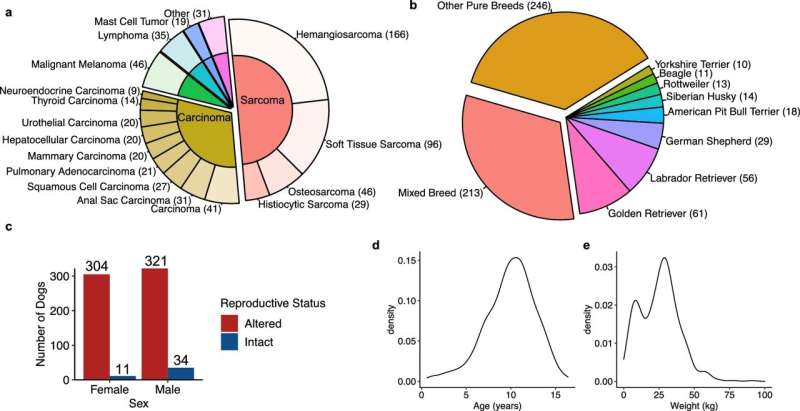This article has been reviewed according to Science X's editorial process and policies. Editors have highlighted the following attributes while ensuring the content's credibility:
fact-checked
peer-reviewed publication
trusted source
proofread
Largest-ever genomic sequencing study of canine cancers reveals striking similarities to human cancers

In a landmark study published today in Scientific Reports, researchers from the Broad Institute of MIT and Harvard, the University of Georgia, and the One Health Company have unveiled the results from the largest-ever genomic sequencing study of canine tumors. The study shows that dog and human cancers are far more genetically similar than previously known and underscores the important role of canine cancer data in accelerating the development of precision treatments for cancer patients of both species.
The study examined real-world clinical genomic data from 671 pet dogs with cancer collected by 200 veterinarians across the United States. The researchers analyzed tumor samples using the commercially available FidoCure sequencing platform to identify genetic mutations driving canine cancers. These samples were then compared to a large database of nearly 25,000 human tumor samples to identify overlapping mutations between the two species.
The researchers discovered several previously unreported mutation hotspots in canine cancers, demonstrated their ability to reliably predict whether a tumor is somatic or germline based on tumor tissue alone, and found eight mutational hotspots shared by humans and dogs.
"This study provides the most comprehensive genomic sequencing data on canine cancers, including several previously unsequenced types, and serves as a much-needed resource for comparative oncology," said Shaying Zhao, a professor at the University of Georgia and a co-author of the study.
The researchers identified 18 mutation "hotspots" that are likely primary drivers of canine cancers. Although 10 of these hotspots have not been previously reported in humans, the remainder were found to overlap with hotspots in human cancers. Many of these hotspots can be targeted with small molecule drugs that are already approved for human cancer patients.
This means canine cancer patients will have increased access to highly effective precision treatments that can replace or augment traditional one-size-fits-all approaches such as chemotherapy, radiation, or surgery. At the same time, the genetic data from canine tumors can accelerate the development of precision cancer drugs for humans.
Moreover, the study demonstrated that the genomic data analyzed by the FidoCure platform can reliably predict whether a genetic mutation is a germline mutation or a somatic mutation using tumor tissue alone. If confirmed, this could reduce the need for additional biopsies and significantly reduce the cost and complexity of cancer diagnoses and molecular profiling, enabling faster and more informed clinical decisions.
By addressing the significant gap in genomic data on canine cancers, this study ushers in an era of precision veterinary medicine through clinical genomics. Prior to this study, fewer than 2,000 canine tumors had been genetically sequenced. This study alone increased the number of canine tumors that have been sequenced by more than 33%, and several hundred more canine tumors have been sequenced since the study concluded in late 2020.
"The results of this study show the incredible potential of combining canine cancer genomics and big data analysis to save lives on both ends of the leash," said Christina Lopes, CEO of One Health Company. "Human cancer research has been moving toward a genomics-based treatment paradigm for decades, but research on canine cancer genomics hasn't kept up. This study is helping to fill in the missing puzzle piece for comparative oncology."
More information: Lucas Rodrigues et al, Shared hotspot mutations in oncogenes position dogs as an unparalleled comparative model for precision therapeutics, Scientific Reports (2023). DOI: 10.1038/s41598-023-37505-2
Journal information: Scientific Reports
Provided by One Health Company

















